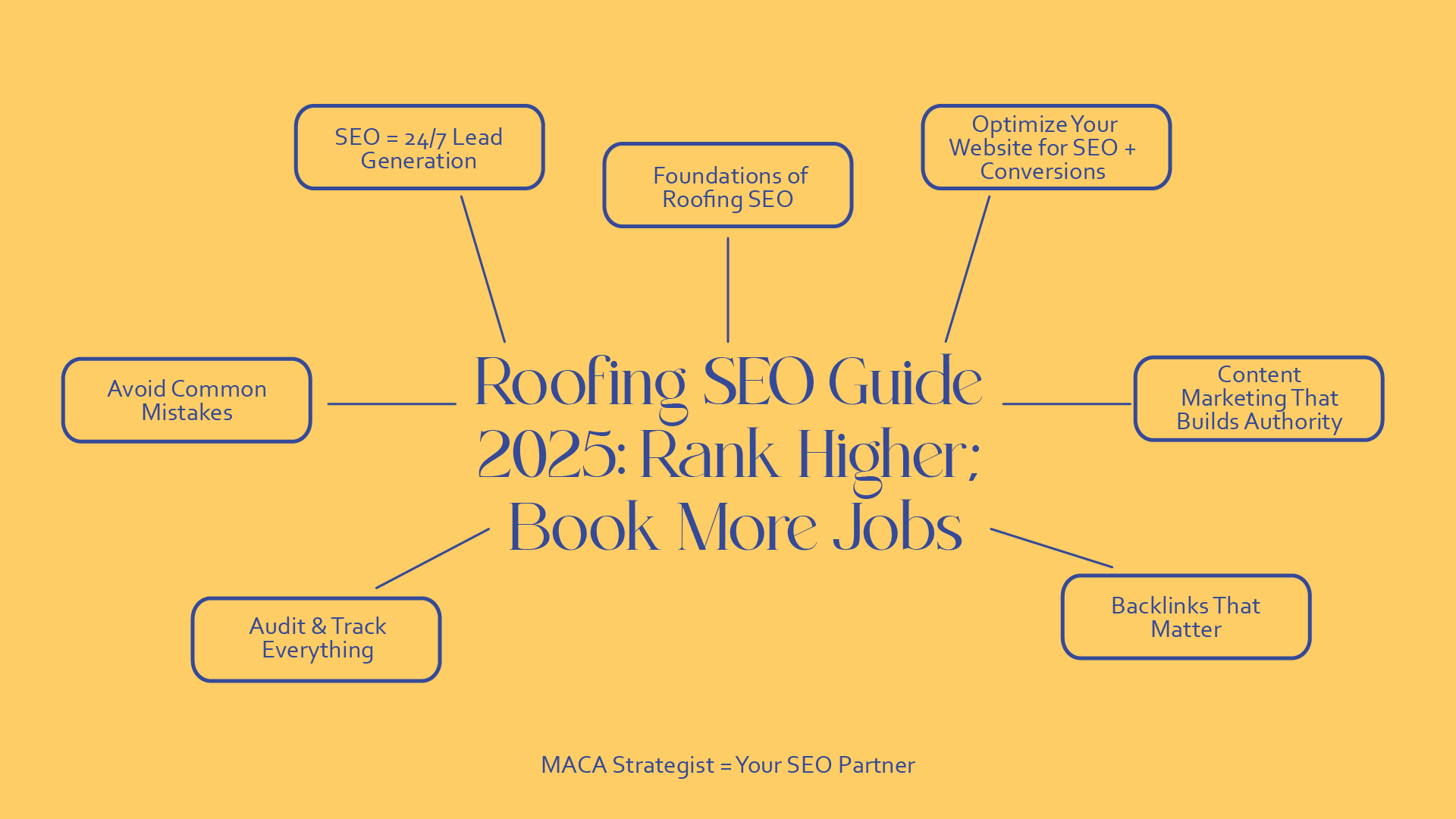Why SEO Matters for Roofing and Home Improvement Businesses
Short answer: In a saturated market, your online visibility is just as important as your craftsmanship. SEO helps local homeowners find you when they need you most—whether it’s for a leaky roof, a kitchen remodel, or a new HVAC system.
Extended answer:
Running a roofing or home improvement business in competitive regions like New York, New Jersey, or Connecticut comes with a unique set of challenges. It’s not just about doing quality work anymore—it’s about being seen doing that quality work.
Today, when homeowners need help, they don’t flip through the Yellow Pages—they Google it. That means if your website isn’t ranking near the top of search results, you’re losing out on leads to competitors who might not be better, just more visible.
SEO = High-Intent Leads at the Right Time
Search Engine Optimization (SEO) ensures your business appears when homeowners are actively searching for services like “emergency roof repair in Hoboken” or “best kitchen remodeling contractor in Westchester.” These aren’t cold leads—they’re warm, intent-driven prospects who already know what they need and are just looking for someone they can trust to do the job right.
That’s where SEO becomes your silent sales rep, working 24/7 to put your services in front of the right audience.
Visibility Is the New Word-of-Mouth
In the home improvement world, reputation has always been everything. But while referrals are still valuable, today’s consumer is just as likely to validate that recommendation—or find a provider from scratch—by searching online. And here’s the thing: consumers trust Google’s top results. In fact, the first three organic search results account for over 50% of all clicks.
When your business appears near the top of local search results, it sends a strong signal that you’re credible, established, and in demand—even before a prospect reads a single review.
SEO Helps You Dominate Your Local Market
A well-optimized SEO strategy doesn’t just improve visibility—it helps you outshine your competitors in local search maps, directories, and voice search (like “Hey Siri, find roofers near me”). SEO tactics like optimizing your Google Business Profile, gathering high-quality backlinks, and publishing location-specific content can dramatically increase your chances of landing high-value jobs.
Here’s what a strong local SEO strategy includes:
- Optimized service pages for each city or neighborhood you serve
- Customer reviews and schema markup to enhance local listings
- Consistent NAP (name, address, phone number) across online directories
- Mobile-friendly, fast-loading website with conversion-focused design
Understanding the SEO Foundation for Contractors
Keyword Research Tailored to Your Trade
You can’t rank without direction. Keyword research gives your content strategy the roadmap it needs to attract the right leads—people who are already searching for the exact services you offer, in the exact areas you serve.
Extended answer:
Imagine building a roof without blueprints. You might eventually get somewhere, but it won’t be efficient—and you’ll probably miss key pieces. That’s exactly what happens when roofing and home service businesses launch SEO campaigns without keyword research. You’re marketing blind.
Keyword research is your map to climbing Google’s rankings. It helps you uncover the exact search terms your potential customers use, so you can create content, service pages, and ads that match their needs word-for-word.
Why Keywords Matter in the Home Services Industry
Unlike national eCommerce brands, local service contractors don’t need to rank for generic terms like “roofing” or “plumbing.” You need hyper-relevant, location-based keywords with strong buyer intent. That means targeting people who are:
- In your service area
- Looking for a specific service
- Ready to take action
These are the golden leads. And they’re searching with phrases like:
- “Emergency roof repair in Brooklyn”
- “Kitchen remodeling near Stamford CT”
- “HVAC installation Westchester County”
- “Affordable deck builder in Bergen County”
- “Licensed plumber Queens NY”
Notice the pattern? These keywords combine service type + location + urgency or qualifier. That’s the sweet spot for local SEO.
Tools of the Trade
You don’t need to be a tech guru to do keyword research. There are user-friendly tools that make it simple to identify high-value search terms, such as:
- Google Keyword Planner: Great for seeing estimated search volume and suggested keywords directly from Google.
- Ubersuggest: A budget-friendly tool that shows keyword difficulty, content ideas, and competitor rankings.
- Ahrefs / SEMrush: More advanced platforms that also let you “spy” on what keywords your competitors rank for—and where you can outrank them.
- Google Autocomplete & “People Also Ask”: Free, real-time sources for discovering how people actually search.
What Makes a Keyword “Good”?
When evaluating keywords, focus on three factors:
- Relevance: Does the keyword match your services and locations?
- Search Volume: How many people search for it each month?
- Competition: How hard is it to rank on page one?
You want high-relevance keywords with decent volume and manageable competition. A term like “Roof repair Bronx NY” may only get 150 searches/month—but if those 150 people are all local and ready to hire, that’s gold.
On-Page Optimization That Works
Once you know your keywords, they need to live on your site strategically. Here’s how:
- Title Tags: Each page should have a unique title incorporating your main keyword (e.g., “Affordable Roof Replacement in Newark, NJ”).
- Meta Descriptions: Write clear, enticing descriptions that encourage clicks.
- Header Tags (H1, H2, H3): Structure your content clearly. H1 for the title, H2 for main sections, and H3 for sub-points.
- Image ALT Text: Use descriptive text with relevant keywords.
- Internal Linking: Link related blog posts and service pages to help users navigate and boost SEO.

Local SEO Is Non-Negotiable
If your business serves a specific geographic area, local SEO isn’t optional—it’s essential. Claim and optimize your Google Business Profile, ensure your contact details are consistent across the web, and focus on building strong reviews and directory listings.
Extended answer:
For roofing contractors, HVAC technicians, plumbers, and remodelers, your client base is hyper-local. You’re not trying to rank nationally—you’re trying to be the top choice in your city, your county, and your service zone. That’s where local SEO comes in.
Local SEO is the strategy that ensures your business appears when someone nearby searches for services like “roof repair near me” or “HVAC technician in White Plains.” And these aren’t just casual clicks—they’re high-intent searches from people ready to book a job.
Start with Google Business Profile
Your Google Business Profile (GBP) is the cornerstone of your local SEO. This free listing appears in Google Search and Google Maps when people look for services in your area. An optimized profile can make the difference between being found—and being invisible.
Steps to optimize your Google Business Profile:
- Claim and verify your business
- Use accurate, complete Name, Address, and Phone Number (NAP)
- Select the most accurate business categories (e.g., “Roofing Contractor”)
- Add a compelling business description with location-based keywords
- Upload high-quality photos of your work, staff, and vehicles
- Post updates regularly (special offers, completed projects, tips)
- Respond to every review—good or bad
Consistency is Key: NAP + Directories
Search engines use your NAP details to verify that your business is legitimate and established. Inconsistencies—like an old phone number on Yelp or a different address on HomeAdvisor—can confuse Google and lower your rankings.
Make sure your business listings are consistent across all platforms, including:
- Yelp
- HomeAdvisor
- Angi (formerly Angie’s List)
- Houzz
- BBB
- Local chamber of commerce directories
You can use tools like BrightLocal, Yext, or Whitespark to audit and manage your listings across dozens of directories at once.
Build Reviews and Social Proof
Online reviews aren’t just nice to have—they directly influence your local rankings. More importantly, they shape consumer trust. Google favors businesses with a high volume of recent, positive reviews—especially when those reviews include keywords and locations.
How to get more local reviews:
- Ask happy customers right after a job is completed
- Include a review link in follow-up emails or text messages
- Respond to all reviews professionally and promptly
- Thank customers who leave detailed, location-rich feedback
Pro tip: Reviews on your Google profile carry the most SEO weight, but don’t ignore other platforms like Facebook or Yelp—they still impact trust and visibility.
Optimizing Your Website for Search and Conversions
Build a High-Converting Site Structure
A good site structure does more than organize content—it guides both users and search engines. Here’s what your website must include:
- Home
- About Us
- Services (with separate pages for each offering)
- Testimonials
- Gallery/Project Portfolio
- Contact Us
- Blog
Speed and Mobile Optimization
Your site should load in under 3 seconds and be fully responsive. Tools like Google’s PageSpeed Insights and GTmetrix can diagnose speed issues.
Schema Markup and Technical SEO
Implement structured data for reviews, services, and location. This can enhance your search listings with rich snippets, improving click-through rates.
Technical SEO tasks include:
- Submitting XML sitemaps
- Fixing crawl errors
- Implementing HTTPS
Content Marketing: The Key to Sustainable Rankings
Blogging for Visibility and Trust
Contractors often ask, “What should I blog about?” Here are content ideas that educate and convert:
- “Top 5 Roofing Materials for New Jersey Homes”
- “Signs You Need a Bathroom Remodel in Stamford”
- “Energy-Efficient HVAC Upgrades for Westchester Homes”
Make sure each post:
- Targets a long-tail keyword
- Includes internal links to your services (e.g., Home improvement marketing agency New York)
- Offers real value—don’t just stuff keywords
Video and Visual Content
Create before-and-after galleries, time-lapse videos of remodels, or how-to maintenance clips. YouTube is the second largest search engine—use it to build brand visibility.
Content Clusters and Pillars
Group related content around a central theme. For example, a main “Roofing Services” page can link to blog posts on roof inspections, materials, maintenance tips, and more.
Backlinks: Earning Authority the Right Way
Short answer: Backlinks are votes of confidence from other websites. To earn them the right way, focus on local partnerships, guest blogging, and well-timed press releases. High-quality backlinks build trust with search engines and can significantly improve your search rankings.
Extended answer:
Backlinks are one of the most powerful signals search engines use to determine a website’s credibility and authority. But not all backlinks are created equal. In fact, chasing shady or low-quality backlinks can actually do more harm than good. Instead, the best way to build your authority is to earn backlinks naturally—by offering real value and creating genuine relationships.
Here’s how to do it the right way:
- Local Partnerships and Sponsorships
Community involvement isn’t just good for your reputation—it’s great for your SEO too. Partner with local charities, nonprofit organizations, community events, or trade schools. Offer sponsorships to local sports teams or vocational programs, and in return, ask for a backlink on their “Partners” or “Supporters” pages.
Not only do these backlinks build domain authority, but they also show search engines (and customers) that you’re an engaged, trustworthy member of your local ecosystem.
Examples:
- Sponsor a Little League team and get listed on their website.
- Provide materials or volunteer time at a trade school event, then be featured on their blog.
- Join your local chamber of commerce, which often includes a business directory with dofollow links.
- Guest Blogging and Industry Features
One of the most effective and scalable strategies is guest blogging. Reach out to niche-specific websites—think home improvement blogs, renovation forums, or local lifestyle magazines—and offer to contribute an article or expert commentary.
If writing isn’t your strength, propose an interview or Q&A format. These are less time-consuming and still highly valuable. A single backlink from a well-ranked, high-traffic site can elevate your SEO and attract targeted leads.
Pro tips:
- Pitch topics that align with both the blog’s audience and your expertise.
- Include a short author bio with a link to your site.
- Don’t over-optimize anchor text—keep it natural.
- Press Releases and Online PR
Big wins deserve to be shared—and optimized. When your business completes a notable project, wins an award, or celebrates a milestone, turn it into a press release. Distribute it through services like PRWeb, Business Wire, or Newswire. These platforms often syndicate your release to dozens of authoritative news sites, resulting in quality backlinks.
You can also send personalized pitches to local journalists or bloggers covering community stories. These earned media opportunities are especially powerful because they combine brand awareness with SEO value.
Final Thoughts
Backlinks are earned, not bought. The more genuine the relationship behind the link, the more weight it will carry with search engines. So focus on building value-first partnerships, contributing meaningful content, and celebrating your successes through strategic PR.
Conversion-Focused SEO for Contractors
Lead Magnets and Contact Forms
Offer downloadable checklists (e.g., “Roof Inspection Guide Before Winter”), free estimates, or consultation forms. Position these throughout your site and blog posts.
Location Pages and Service Areas
Create geo-specific landing pages. Example:
- Roofing services in Hoboken NJ
- Kitchen remodeling in Greenwich CT
Each should include:
- Custom copy
- Testimonials from the area
- Local images
- Calls to action
Call Tracking and Analytics
Use tools like CallRail and Google Analytics to measure lead sources. Know which keywords, blog posts, or landing pages are driving traffic and conversions.
Common Mistakes Roofing and Remodeling Contractors Make
Ignoring Mobile Optimization
Over 60% of local service searches happen on mobile. A non-responsive site can sink your SEO and frustrate users.
Neglecting Online Reviews
Reviews are powerful. Encourage satisfied clients to leave feedback on Google, Yelp, and other platforms. Respond to all reviews, even negative ones, to show professionalism.
Skipping SEO Audits
Short answer: Skipping regular SEO audits leaves your website vulnerable to issues like broken links, keyword gaps, and outdated content—all of which hurt rankings and user experience. Tools like SEMrush and Ahrefs make audits easier and more impactful.
Extended answer:
Think of your website like a car. You wouldn’t drive it for years without an oil change or a check-up, right? SEO audits are the digital equivalent of regular maintenance—and skipping them means you’re gambling with your traffic, visibility, and ultimately, your revenue.
Regular SEO audits help you identify technical errors, content issues, and strategic gaps before they grow into bigger problems. When left unchecked, issues like 404 errors, slow page speeds, duplicate content, or outdated schema markup can significantly harm your search engine rankings. Worse, they create a frustrating experience for visitors, leading to higher bounce rates and lower conversions.
What Do SEO Audits Actually Cover?
An effective audit covers both technical and content-related aspects of your website. Here are the key areas to inspect:
- Technical Health: Check for broken links, crawl errors, redirects, and indexing issues. These directly affect how search engines interpret your site.
- Content Performance: Identify thin content, duplication, or pages missing target keywords.
- Keyword Opportunities: Use tools like Ahrefs or SEMrush to uncover keyword gaps where your competitors are ranking, but you aren’t.
- User Experience (UX): Assess mobile-friendliness, page speed, and navigational ease. Google values great UX as part of its ranking algorithm.
- Backlink Profile: Examine the quality of inbound links and remove any toxic backlinks that could trigger penalties.
Tools That Make It Easier
You don’t need to manually comb through every page. Industry-leading SEO tools like SEMrush, Ahrefs, Screaming Frog, and Google Search Console provide comprehensive audit reports. These platforms identify issues like:
- Broken internal/external links
- Missing or duplicated meta tags
- Redirect chains
- Content cannibalization
- Keyword usage anomalies
Most tools also offer recommendations, so you’re not just told what’s wrong—you’re given clear guidance on how to fix it.
How Often Should You Audit?
Ideally, you should perform a comprehensive SEO audit every quarter, with lighter, focused audits monthly. If you’re in a fast-paced industry or run an e-commerce site with frequent updates, monthly deep dives might be even more beneficial.
Takeaway
Skipping SEO audits is like ignoring the warning lights on your dashboard. Sure, you might get by for a while, but eventually, things will break down—and by then, the damage might be harder (and more expensive) to fix. Regular audits ensure your SEO strategy remains agile, competitive, and aligned with search engine updates.
Tools and Resources for Home Service SEO
- Google Business Profile: Critical for local visibility
- Moz Local: Helps manage directory listings
- Ubersuggest: Budget-friendly keyword research tool
- Yoast SEO: Plugin for optimizing WordPress sites
Trusted External Resources
- U.S. Small Business Administration – for marketing and business growth tips
- Statista – for industry stats and trends
- U.S. Census Bureau – for demographic data to guide location targeting
Elevate Your Rankings with MACA Strategist
In MACA Strategist we know the ins and outs of lead generation for roofing contractors New Jersey, SEO for kitchen remodelers Connecticut, and website design for bathroom remodelers in Stamford CT. As the best home improvement marketing agency White Plains NY, we tailor every strategy to meet the unique needs of your business.
Ready to grow your home improvement business through smarter SEO, content, and lead generation strategies? Partner with a home improvement marketing agency New York that truly understands your industry.
Book a free consultation with MACA Strategist today and start ranking higher, converting better, and growing faster.






